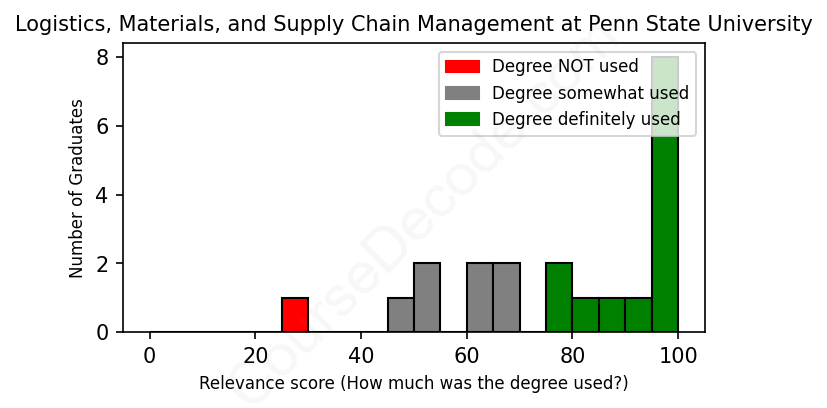
First, some facts. Of the Logistics, Materials, and Supply Chain Management graduates from Penn State University we've analyzed , here's how many have used (or NOT used) their degree in their career:

These are estimates based on AI analysis of 21 LinkedIn profiles (see below).
The verdict? Significantly above average. Overall, with an average relevance score of 78%, Logistics, Materials, and Supply Chain Management graduates from Penn State University have a much higher likelihood (+11%) of finding work in this field compared to the average graduate across all fields:
And for comparison, here's the chart for all profiles we've looked at across all degrees.
Also, after graduating, only 14% of these graduates have pursued further education other than another Bachelor's degree (such as a Masters degree or other), compared to the average across all profiles of 35%. This suggests a Bachelors degree is enough for most Logistics, Materials, and Supply Chain Management graduates, and it's normal to look for work straight after graduation.
See the details:
|
Relevance score: 65% We think this person has gone into a career only somewhat relevant to their degree. We think this person has gone into a career only somewhat relevant to their degree.
DEGREE INFOGraduated in 2014 from Penn State University with a Bachelor of Science (BS) in Logistics, Materials, and Supply Chain Management. No other secondary education since. JOB HISTORY SINCE GRADUATIONSupply Chain Coordinator ARMADA Supply Chain Solutions May 2014 - Mar 2015 Supply Planner  ARMADA Supply Chain Solutions Mar 2015 - Jul 2017 Functional Consultant  WCS Consulting Jul 2017 - Feb 2019 Senior Consultant  EY Mar 2019 - Present ABOUTNo information provided. |
The top 10 most common jobs done by the graduates we've analyzed (ranked most common to least) are:
From analyzing the LinkedIn profiles of graduates from Penn State University's Logistics, Materials, and Supply Chain Management program, it seems like many of them have landed jobs that align pretty well with their degree. Most common positions include roles like Supply Chain Analysts, Procurement Specialists, and various managerial positions within logistics companies like DHL and Amazon. These jobs typically require a solid understanding of supply chain principles, which these graduates are trained in, demonstrating a clear path from education to career.
However, not all jobs showcased the relevance of their studies. Some graduates have taken on roles that stray far from logistics; positions like Head Chef, Image Consultant, and various project management roles that primarily emphasize different skill sets. While some of these jobs may touch on logistics concepts, the core qualifications of their degree aren't fundamentally required. Overall, there's a strong correlation for many graduates between their jobs and their studies, although there's a noticeable minority who have ventured into quite different fields or roles where their logistics degree isn't the primary focus.
Here is a visual representation of the most common words in job titles for Logistics, Materials, and Supply Chain Management graduates (this is across all Logistics, Materials, and Supply Chain Management graduates we've analyzed, not just those who went to Penn State University):

These graduates from Penn State University with degrees in Logistics, Materials, and Supply Chain Management generally have pretty solid career trajectories. For many of them, their first jobs after graduating usually relate directly to supply chain or logistics roles. Positions like Procurement Specialists, Supply Chain Coordinators, and Operations Managers seem to be common starting points, showing that they often jump right into the industry they prepared for in school. It’s a promising sign that graduates are finding relevant opportunities early in their careers, with many quickly moving up the ranks within their companies or transitioning smoothly to other respected organizations.
Fast forward about 5 to 10 years, and it’s clear that many graduates continue to thrive in the field. They tend to level up into more senior roles such as Supply Chain Managers, Logistics Directors, or Consultants at reputable firms like Deloitte or EY. There are even some who branch out into managerial or directorial positions in related industries, which speaks volumes about the versatility and demand for their skills. There are a few outliers who veer off into unrelated fields, but overall, the majority seem to be carving out successful careers that leverage their education in logistics and supply chain management. This trend depicts a strong connection between their degree and their career growth, making it a worthwhile path for those interested in these fields!
Honestly, the Bachelor’s degree in Logistics, Materials, and Supply Chain Management at Penn State—or really any university—can be a bit of a mixed bag. It’s not considered the toughest degree out there, but it does have its challenges. You’ll dive into some technical stuff like data analysis and operations management, so if math and problem-solving aren’t your strong suits, you might find it a bit harder. On the flip side, if you enjoy working with systems and figuring out efficiencies, you could find it pretty manageable. Overall, it’s more on the average side in terms of difficulty; you’ll need to stay organized and engaged, but it’s definitely doable if you put in the effort!
Most commonly, in the LinkedIn profiles we've looked at, it takes people 4 years to finish a Bachelor degree in Logistics, Materials, and Supply Chain Management.
Looking at the career paths of these Penn State Logistics, Materials, and Supply Chain Management graduates, it seems like they’re generally doing pretty well for themselves. Many of them started in solid entry-level positions and have moved up to roles with more responsibility and presumably higher pay, especially those in management and specialized roles at reputable companies like Lockheed Martin, PepsiCo, and Deloitte. The path from Coordinator to Manager or Analyst to Senior Consultant speaks volumes about their growth potential and earning capacity in the field. Some have even landed jobs with significant titles right out of school, indicating a good salary trajectory. Overall, it appears that they’re setting themselves up for decent financial success in their careers!
Here is a visual representation of the most common words seen in the "about" section of LinkedIn profiles who have a Bachelor degree in Logistics, Materials, and Supply Chain Management (this is across all Logistics, Materials, and Supply Chain Management graduates we've analyzed, not just those who went to Penn State University). This may or may not be useful:

Here are all colleges offering a Bachelor degree in Logistics, Materials, and Supply Chain Management (ordered by the average relevance score of their Logistics, Materials, and Supply Chain Management graduates, best to worst) where we have analyzed at least 10 of their graduates:
| College | Score | Count |
|---|---|---|
 Michigan State University Michigan State University
|
84 | 23 |
 Auburn University Auburn University
|
83 | 19 |
 Ashford University Ashford University
|
82 | 12 |
 University of Wisconsin-Milwaukee University of Wisconsin-Milwaukee
|
81 | 10 |
 Rutgers Business School Rutgers Business School
|
79 | 24 |
 Penn State University Penn State University
|
78 | 21 |
 Embry-Riddle Aeronautical University Embry-Riddle Aeronautical University
|
78 | 10 |
 Arizona State University - W. P. Carey School of Business Arizona State University - W. P. Carey School of Business
|
78 | 14 |
 Iowa State University Iowa State University
|
77 | 14 |
 University of Houston University of Houston
|
76 | 30 |
 University of Arkansas University of Arkansas
|
76 | 18 |
 University of Tennessee, Knoxville University of Tennessee, Knoxville
|
75 | 15 |
 University of North Texas University of North Texas
|
69 | 14 |
 Texas A&M University Texas A&M University
|
67 | 27 |
 Georgia Southern University Georgia Southern University
|
62 | 13 |
 The Ohio State University The Ohio State University
|
60 | 10 |
 University of Houston-Downtown University of Houston-Downtown
|
57 | 13 |